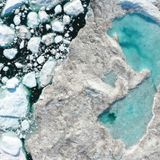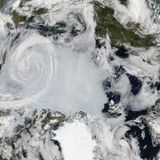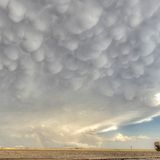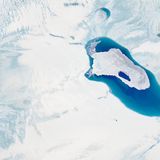RECENT ARTICLES

Heat-Trapping Methane Surged in 2020
Methane concentrations in the atmosphere surged at a record rate in 2020, NOAA scientists yesterday.The Earth-warming gas increased by 14.7 parts per billion, the largest annual rise since scientists started taking measurements in the 1980s.It’s worrying news for the climate. Methane is a much more potent greenhouse gas than carbon dioxide, especially in the short term. Over a 20-year period, its climate-warming potential is more than 80 times stronger than CO2.Recent increases in atmospheric methane have been a source of both concern and debate among scientists.Methane steadily...…Methane concentrations in the atmosphere surged at a record rate in 2020, NOAA scientists yesterday.The Earth-warming gas increased by 14.7 parts per billion, the largest annual rise since scientists started taking measurements in the 1980s.It’s worrying news for the climate. Methane is a much more potent greenhouse gas than carbon dioxide, especially in the short term. Over a 20-year period, its climate-warming potential is more than 80 times stronger than CO2.Recent increases in atmospheric methane have been a source of both concern and debate among scientists.Methane steadily...WW…

Lightning Rises Sharply in the Arctic
Lightning is relatively uncommon in the Arctic—the air is usually not warm enough for thunderstorms. Now that might be changing, new data suggests.A recently published in the journal Geophysical Research Letters finds that Arctic lightning has tripled in the last decade alone.The researchers, led by Bob Holzworth of the University of Washington, analyzed data collected by the World Wide Lightning Location Network between 2010 and 2020. The network, operated by the University of Washington, has lightning sensors all over the world.The new study focused on summer...…Lightning is relatively uncommon in the Arctic—the air is usually not warm enough for thunderstorms. Now that might be changing, new data suggests.A recently published in the journal Geophysical Research Letters finds that Arctic lightning has tripled in the last decade alone.The researchers, led by Bob Holzworth of the University of Washington, analyzed data collected by the World Wide Lightning Location Network between 2010 and 2020. The network, operated by the University of Washington, has lightning sensors all over the world.The new study focused on summer...WW…

U.S. Cities Are Underestimating Their Greenhouse Gas Emissions
Cities across the country are inadvertently underestimating their greenhouse gas emissions, new research suggests. And in many cases, they’re undercounting by a lot.In a of 48 U.S. urban areas, researchers found that the average city had underreported its carbon dioxide emissions by nearly 20%. But in some cases, the report was more than 100% off.Torrance, Calif., and Blacksburg, Va., had some of the largest underestimates, at over 145% and 123% respectively. A few cities actually overreported their emissions—Benicia, Calif., was the most extreme case, overestimating by about...…Cities across the country are inadvertently underestimating their greenhouse gas emissions, new research suggests. And in many cases, they’re undercounting by a lot.In a of 48 U.S. urban areas, researchers found that the average city had underreported its carbon dioxide emissions by nearly 20%. But in some cases, the report was more than 100% off.Torrance, Calif., and Blacksburg, Va., had some of the largest underestimates, at over 145% and 123% respectively. A few cities actually overreported their emissions—Benicia, Calif., was the most extreme case, overestimating by about...WW…

U.S. Cities Are Underestimating Their Greenhouse Gas Emissions
Cities across the country are inadvertently underestimating their greenhouse gas emissions, new research suggests. And in many cases, they’re undercounting by a lot.In a of 48 U.S. urban areas, researchers found that the average city had underreported its carbon dioxide emissions by nearly 20%. But in some cases, the report was more than 100% off.Torrance, Calif., and Blacksburg, Va., had some of the largest underestimates, at over 145% and 123% respectively. A few cities actually overreported their emissions—Benicia, Calif., was the most extreme case, overestimating by about...…Cities across the country are inadvertently underestimating their greenhouse gas emissions, new research suggests. And in many cases, they’re undercounting by a lot.In a of 48 U.S. urban areas, researchers found that the average city had underreported its carbon dioxide emissions by nearly 20%. But in some cases, the report was more than 100% off.Torrance, Calif., and Blacksburg, Va., had some of the largest underestimates, at over 145% and 123% respectively. A few cities actually overreported their emissions—Benicia, Calif., was the most extreme case, overestimating by about...WW…

Earth Has Lost 28 Trillion Tons of Ice since the Mid-1990s
The world’s frozen places are shrinking—and they’re disappearing at faster rates as time goes by.In the 1990s, the world was losing around 800 billion metric tons of ice each year. Today, that number has risen to around 1.2 trillion tons.Altogether, the planet lost a whopping 28 trillion tons of ice between 1994 and 2017.That’s according to a new study, published today in the journal The Cryosphere, calculating all the ice lost around the globe over the last few decades.It’s the first to provide a truly global analysis of the planet’s vanishing ice, the authors say. It accounts for...…The world’s frozen places are shrinking—and they’re disappearing at faster rates as time goes by.In the 1990s, the world was losing around 800 billion metric tons of ice each year. Today, that number has risen to around 1.2 trillion tons.Altogether, the planet lost a whopping 28 trillion tons of ice between 1994 and 2017.That’s according to a new study, published today in the journal The Cryosphere, calculating all the ice lost around the globe over the last few decades.It’s the first to provide a truly global analysis of the planet’s vanishing ice, the authors say. It accounts for...WW…

With Fires, Heat and a Cyclone, Arctic Breaks Melting Record
Arctic sea ice hit an all-time low for July against a backdrop of record-breaking temperatures and raging wildfires at the northern reaches of Earth.Then a cyclone began swirling over the thinning ice this week.Taken together, those conditions have made scientists concerned about what the rest of the season may hold as thousands of miles of sea ice melts away every day.Ice cover in the Arctic Ocean hit an all-time low for this time of year on July 15, according to the National Snow and Ice Data Center. Sea ice was disappearing at a rate of more than 56,400 square miles a day earlier this...…Arctic sea ice hit an all-time low for July against a backdrop of record-breaking temperatures and raging wildfires at the northern reaches of Earth.Then a cyclone began swirling over the thinning ice this week.Taken together, those conditions have made scientists concerned about what the rest of the season may hold as thousands of miles of sea ice melts away every day.Ice cover in the Arctic Ocean hit an all-time low for this time of year on July 15, according to the National Snow and Ice Data Center. Sea ice was disappearing at a rate of more than 56,400 square miles a day earlier this...WW…

Clouds May Be the Key to a Climate Modeling Mystery
The newest generation of global climate models is running hotter than earlier versions, with many models predicting stronger future warming than their predecessors.It‘s a confusing trend, and scientists have been working to figure out why it‘s happening. A out this week suggests that clouds—and the tiny particles that help them form in the atmosphere—have something to do with it.For the past several years, researchers have been working on an international project known as the Coupled Model Intercomparison Project, or CMIP. Every few years or so, modelers around the world...…The newest generation of global climate models is running hotter than earlier versions, with many models predicting stronger future warming than their predecessors.It‘s a confusing trend, and scientists have been working to figure out why it‘s happening. A out this week suggests that clouds—and the tiny particles that help them form in the atmosphere—have something to do with it.For the past several years, researchers have been working on an international project known as the Coupled Model Intercomparison Project, or CMIP. Every few years or so, modelers around the world...WW…

Persistent Cloudless Skies Helped Fuel Exceptional Greenland Ice Melt
The Greenland ice sheet saw some of its highest melt rates on record last summer. Now, scientists say they know why it happened.It’s not only that temperatures were warm in the Arctic. An unusual set of atmospheric conditions, which altered the movement of air and the formation of clouds over Greenland, was a primary driver of the melting ice.These conditions may be linked to climate change in the Arctic, the researchers note. That raises the question of whether these kinds of extreme melting events might happen more frequently in the years ahead.“The real question is how much, how many of...…The Greenland ice sheet saw some of its highest melt rates on record last summer. Now, scientists say they know why it happened.It’s not only that temperatures were warm in the Arctic. An unusual set of atmospheric conditions, which altered the movement of air and the formation of clouds over Greenland, was a primary driver of the melting ice.These conditions may be linked to climate change in the Arctic, the researchers note. That raises the question of whether these kinds of extreme melting events might happen more frequently in the years ahead.“The real question is how much, how many of...WW…

Because of Rising CO 2 , Trees Might Be Warming the Arctic
The Arctic is one of the fastest-warming places on the planet —and scientists still aren’t completely sure why.Melting snow and ice may be speeding up the warming. Changes in atmospheric circulation could be playing a role. Many factors could be influencing the region’s temperatures, which are rising at least twice as fast as the rest of the world.Now, scientists think they may have discovered an additional piece of the puzzle. Plants, it turns out, may have an unexpected influence on global warming.As carbon dioxide levels rise in the atmosphere, plants become more efficient at carrying...…The Arctic is one of the fastest-warming places on the planet —and scientists still aren’t completely sure why.Melting snow and ice may be speeding up the warming. Changes in atmospheric circulation could be playing a role. Many factors could be influencing the region’s temperatures, which are rising at least twice as fast as the rest of the world.Now, scientists think they may have discovered an additional piece of the puzzle. Plants, it turns out, may have an unexpected influence on global warming.As carbon dioxide levels rise in the atmosphere, plants become more efficient at carrying...WW…
- Total 9 items
- 1